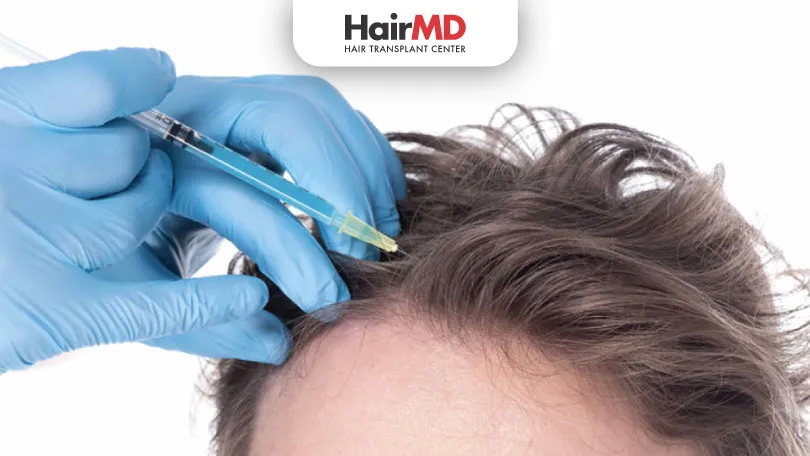4th Dec, 2023

When you notice a consistent hair fall, you will want to do everything to curb or stop it. But you would see results only when you do what’s right. Plasma Rich Platelet or PRP for hair fall and Growth Factor Concentrate or GFC treatment for hair loss are two procedures that have gained fame across the field of dermatology. Both are effective. But GFC vs. PRP hair treatment – which one is better? Let’s find out the answer.
What’s covered in the article?
- What is PRP for Hair Fall?
- Benefits of PRP for Hair Fall
- What is GFC Treatment for Hair Loss?
- Benefits of GFC Treatment for Hair Loss
- GFC vs. PRP Hair Treatment – Which One is Better?
- Conclusion
What is PRP for Hair Fall?
Platelet Rich Plasma (PRP) uses the patient’s rich blood plasma to stimulate hair follicle growth for himself. PRP for hair fall is a proven treatment. It has helped many people, both males and females regrow hair in a few sessions. The treatment enhances the body’s stem cell and collagen levels, thus helping hair growth.
The process involves drawing blood from the arm. The blood will contain rich plasma to use for your hair. The dermatologists then examine the blood for PRP through a centrifuge. Further, they inject local anesthesia on the scalp and inject an injection containing the PRP treatment into the bald spots.
Benefits of PRP for Hair Fall
Some benefits of PRP for hair fall include the following.
- Strengthens the hair
- Increases existing hair’s diameter
- Safe as no cuts or incisions involved
- Non-allergenic, as it uses the patient’s own material
- Darkening and thickening of the hair
What is GFC Treatment for Hair Loss?
The Growth Factor Concentrate procedure involves using the patient’s own blood. It uses a highly concentrated growth factor preparation that dermatologists inject into the patient’s scalp and neck to foster hair growth. It relies on various growth factors from the patient’s blood. They include platelet-derived, epidermal, insulin-like, and vascular endothelial growth factors.
The process involves dermatologists taking around 16 ml of blood. It takes around 50 minutes to an hour to derive the growth factor and prepare the GFC treatment for hair loss. Eventually, the dermatologist will have about 8-9 ml of GFC hair treatment they can inject into the patient’s scalp.
Benefits of GFC Treatment for Hair Loss
Some benefits of GFC treatment include the following.
- Reduced hair fall
- Thicker and fuller hair in volume
- Benefits people in the early Alopecia stages
- Short-duration treatment – takes only about 30 minutes to complete
- Safe, non-invasive, and no scarring involved
- Sustained hair regrowth of about 75-80 percent
GFC vs. PRP Hair Treatment – Which One is Better?
Generalizing whether GFC or PRP is better isn’t possible. Both treatments are beneficial in their own right. Besides, individual suitability also matters when choosing between GFC and PRP treatment. The best way to know the better alternative between GFC and PRP, specifically in your case, is to consult a dermatologist and know what’s right for your condition. It will help ensure safe and effective results.
Do You Know?
Nearly 250 Patients Visit HairMD
Everyday For Various Hair Concerns?
(Your journey to healthier and fuller hair starts here!)
Meet Our Dermatologists
Conclusion
Further Reading
A Complete Guide to Hair Loss: Causes, Treatments, and Prevention Strategies
Explore a complete guide to hair loss, including its causes, treatment options, and prevention tips. Get expert advice from HairMD clinics
Everything you need to know about Laser Hair Removal
Learn everything about laser hair removal, including benefits, procedure, and aftercare tips.
Ultimate Food Guide For Healthy Hair
Discover the Food For Healthy Hair. Learn how nutrients like biotin, zinc, and omega-3 fatty acids contribute to hair strength and shine.
Top Reasons Behind Hair Loss in Young Adults and How to Fix It!
The top reasons for hair loss in young adults, including genetic factors, hormonal imbalances, stress, lifestyle choices, nutritional deficiencies, & medical conditions.
Have thoughts? Please let us know
We are committed not only to treating you, but also educating you.











